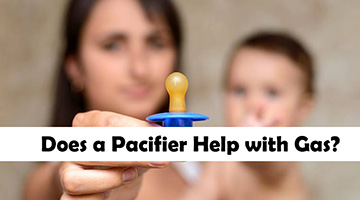When babies experience discomfort due to gas, parents often search for ways to alleviate their discomfort. One common question is whether a pacifier can help with gas.
The answer is yes, sucking on a pacifier helps the baby with gas relief, but it’s not a cure-all solution. The release of endorphins that come with sucking on a pacifier can help to soothe your baby. Additionally, pacifiers can act as a temporary distraction, giving the baby’s mind a break from the discomfort until a more effective solution is found.

However, the scientific evidence on whether pacifiers can effectively relieve gas is limited and mixed. In this article, we’ll explore the potential benefits and drawbacks of using a pacifier to relieve gas in infants.
How Does a Pacifier Help with Gas?
There are several ways a pacifier can help to reduce gas in a baby.
1. By Releasing Hormones
Sucking on a pacifier can help to release endorphins, which are natural hormones produced by the body that can help to reduce stress, pain, and depression.
These hormones can also have an impact on digestive issues like gas. When a baby sucks on a pacifier, it triggers the release of endorphins, which can help to soothe the baby and reduce discomfort.
2. By Controlling the Breathing
In addition to releasing hormones, sucking on a pacifier can also help to control the baby’s breathing. When a baby sucks on a pacifier, it slows down their breathing pattern, which can help to decrease the amount of air that the baby takes in. This can be especially helpful for babies who are experiencing gas-related discomfort, as excess air in the stomach can contribute to gas.
By controlling the baby’s breathing, a pacifier can help to reduce the amount of air that the baby needs to push out, which in turn can reduce gas. This can provide some relief for the baby and help to soothe them during periods of gas-related discomfort.
3. By Creating Distruction And Helping to Fall Asleep
When a baby is experiencing gas-related discomfort, sucking on a pacifier can help to distract them from the discomfort and provide some relief.
Furthermore, the calming effect of sucking on a pacifier can also help a baby to fall asleep. This can be especially helpful for babies who are experiencing gas-related discomfort during the night.
In addition, it can also give parents time to take necessary steps if it’s an emergency.
Do Pacifiers Make Babies More Gassy?
There is no clear evidence to prove that pacifiers make babies more gassy. In fact, as we discussed earlier, pacifiers can actually help to soothe a gassy baby by releasing endorphins, slowing down their breathing, and providing a distraction.
However, it is important to note that excessive use of pacifiers can interfere with a baby’s feeding and can lead to other problems such as ear infections, tooth decay, and speech problems later in life.
Furthermore, some babies may develop a preference for using a pacifier instead of feeding, which can cause them to swallow more air and become gassier.
If you notice that your baby is using a pacifier excessively or is having trouble feeding, it’s a good idea to talk to your pediatrician to rule out any underlying issues and get advice on how to manage your baby’s gas and feeding needs.
Do Pacifiers Help With Digestion?
Although there is some dispute over whether pacifiers can aid digestion, this seems to be the prevailing opinion.
Pacifiers can help to soothe and calm a baby, which can, in turn, help to relax the muscles in the digestive system, making it easier for the baby to digest their food.
Additionally, the sucking action of a pacifier can help to stimulate the production of saliva, which can also aid in the digestive process.
Some children seem to find that sucking on a pacifier helps them to digest their food. Some people discover it creates a dissimilarity. Others find it doesn’t.
If your child is struggling with digestion, it might be worth trying a pacifier to see if it makes a difference. However, if your child does not like pacifiers, then there is no need to force them to use one.
Benefits Of Using a Pacifier
A pacifier has many benefits, especially for newborns and young babies. Pacifiers help to soothe and calm babies and can be a great way to help them fall asleep. Additionally, pacifiers can help reduce the risk of Sudden Infant Death Syndrome (SIDS). Pacifiers are also convenient for parents and caregivers, as they can help babies stay calm and content while out and about.
- A fussy baby may find comfort in a pacifier.
- Flight discomfort may be reduced with a pacifier.
- It might be simpler for your baby to go asleep with a pacifier.
- A pacifier provides a brief diversion.
- The risk of SIDS may be lowered with a pacifier.
- The use of pacifiers is temporary.
FAQs On Using Pacifier
How many hours can a baby use a pacifier?
A pacifier should only be used for 6 hours per day.
Can Your Baby Sleep With A Pacifier All Night?
Yes, it is generally safe for babies to sleep with a pacifier all night. In fact, using a pacifier can have benefits for both the baby and parents. Pacifiers can help soothe and calm a fussy baby, making it easier for them to fall asleep and stay asleep. Additionally, research suggests that pacifier use may even reduce the risk of Sudden Infant Death Syndrome (SIDS).
Is a Pacifier Good For a Colicky Baby?
Yes, a pacifier is good for a colicky baby. However, there are many other alternatives for a colicky baby these days, such as silicone teething rings, finger pops, and bottle teethers. Crib toys are also shaped like pacifiers and are good alternatives for colicky babies.
How Do I Teach My Baby to Self-Soothe Without a Pacifier?
There are a few different ways that you can teach your baby to self-soothe without a pacifier. One way is to offer them a comfort object, such as a stuffed animal or a blanket, to help them feel secure.
You can also rock them or hold them close while they fall asleep. Another method is to gradually phase out the use of the pacifier by only offering it during naps or bedtime, for example.
Ultimately, every baby is different, so you must experiment to find what works best for your child.
The Final Thought
There is some discussion that using a pacifier may help babies with gas. Still, there is no guarantee that it will work for every baby. A pacifier can help with gas because it can provide a source of comfort for a baby.
Additionally, the act of sucking can help to massage the baby’s stomach, which can also help to release any gas. It also helps calm the baby and can even help them sleep better.
